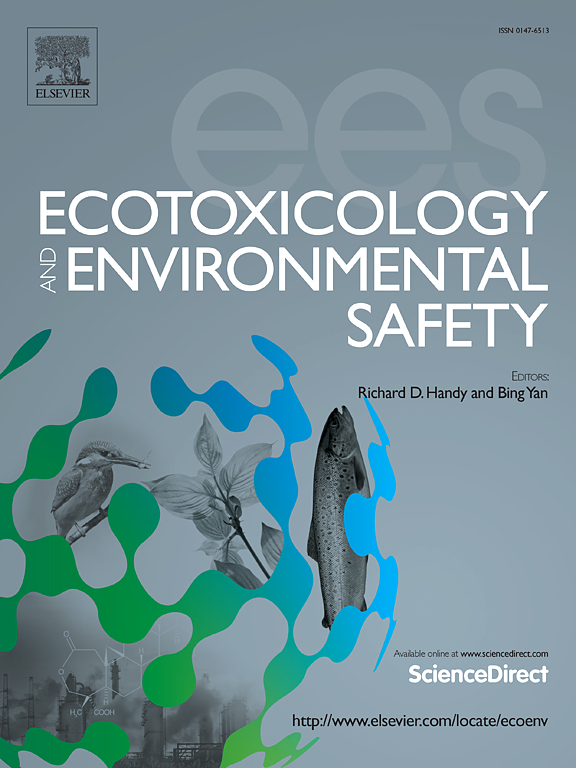Bioaerosol emission and exposure risk from a wastewater treatment plant in winter and spring
IF 6.1
2区 环境科学与生态学
Q1 ENVIRONMENTAL SCIENCES
引用次数: 0
Abstract
The potential health risks posed by bioaerosols containing pathogens originating from wastewater treatment plants (WWTPs) have gaining intensive attention. This study designated sampling locations within a WWTP situated in Xi'an, a major city in northwest China. The airborne bacterial concentration, taxonomic composition, and the associated health risks were analyzed in the aeration tanks with bottom microporous aeration system. The Anaerobic-Anoxic-Oxic (AAO) tank emitted significantly higher culturable bacteria (1.58×104 CFU m−3 in spring, 6.69×103 CFU m−3 in winter) compared to Double-ditch (DE) oxidation ditch and aerated grit chamber (AGC) chamber, aligning with 16S rDNA quantification results. The bacterial concentrations are higher in spring than that in winter, with the AAO tank posing the highest exposure risk during the spring season. The dominant genera in the air samples include Cutibacterium, Lawsonella, Acinetobacter, Pseudomonas, and Aeromonas. Among the identified genus, 139 bacterial genera were identified as potential human pathogens like Neisseria, Moraxella, Haemophilus, Escherichia-Shigella and Streptococcus. These pathogens further elevate exposure risks from WWTP bioaerosols. This study provides relevant information on the seasonal health risk variations tied to bioaerosol emissions from diverse aeration tanks with bottom microporous aeration system in the mega city of northwest China, emphasizing the imperative to enhance the management and control measures for bioaerosols originating from the AAO tank.
冬春季节污水处理厂的生物气溶胶排放和暴露风险。
污水处理厂(WWTPs)产生的含有病原体的生物气溶胶对健康造成的潜在风险日益受到关注。本研究在位于中国西北部大城市西安的污水处理厂内指定了采样点。在底部微孔曝气系统的曝气池中分析了空气中的细菌浓度、分类组成以及相关的健康风险。与双沟(DE)氧化沟和充气沉砂池(AGC)相比,厌氧-缺氧-缺氧(AAO)池排放的可培养细菌数量明显较高(春季为 1.58×104 CFU m-3,冬季为 6.69×103 CFU m-3),与 16S rDNA 定量结果一致。春季的细菌浓度高于冬季,春季 AAO 罐的接触风险最高。空气样本中的主要菌属包括 Cutibacterium、Lawsonella、Acinetobacter、Pseudomonas 和 Aeromonas。在已确定的菌属中,有 139 个菌属被确定为潜在的人类病原体,如奈瑟氏菌、莫拉氏菌、嗜血杆菌、志贺氏杆菌和链球菌。这些病原体进一步提高了接触污水处理厂生物气溶胶的风险。这项研究提供了与中国西北部特大城市中带有底部微孔曝气系统的各种曝气池所排放的生物气溶胶有关的季节性健康风险变化的相关信息,强调了加强对来自 AAO 池的生物气溶胶的管理和控制措施的必要性。
本文章由计算机程序翻译,如有差异,请以英文原文为准。
求助全文
约1分钟内获得全文
求助全文
来源期刊
CiteScore
12.10
自引率
5.90%
发文量
1234
审稿时长
88 days
期刊介绍:
Ecotoxicology and Environmental Safety is a multi-disciplinary journal that focuses on understanding the exposure and effects of environmental contamination on organisms including human health. The scope of the journal covers three main themes. The topics within these themes, indicated below, include (but are not limited to) the following: Ecotoxicology、Environmental Chemistry、Environmental Safety etc.

 求助内容:
求助内容: 应助结果提醒方式:
应助结果提醒方式:


